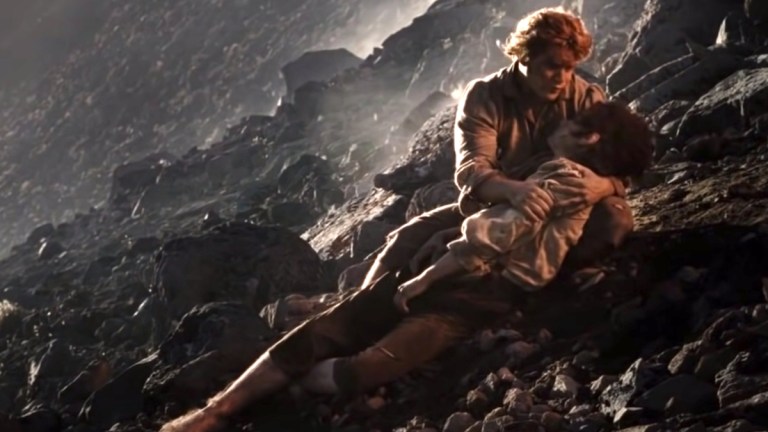Lord of the Rings: Let’s Explore the Queer-Coding of Sam and Frodo
The Lord of the Rings films offer a vivid and complex representation of friendship, fellowship, and male-to-male intimacy. Is there space to also interpret Sam and Frodo's connection as something more?

The Lord of the Rings films resonate with millions of people for as many reasons as the trilogy is long. The special effects are outstanding; the way the movies pluck exquisitely from the source material while carving their own path forward helps to satisfy all audiences; and director Peter Jackson immerses the viewers into a world that fully validates the high fantasy genre on the big screen. Still, all of these pros are outweighed by the series’ ability to resonate on a human level.
The friendships, love, and affection that the Fellowship of the Ring creates in the first movie carry the trilogy’s emotional weight all the way through to the end, and no pairing symbolizes this heft better than Frodo Baggins (Elijah Wood) and Samwise Gamgee (Sean Astin). Frodo and Sam are the ultimate fantasy duo. They pick each other up when the other one is down (although this is lopsided in Sam’s favor), and the One Ring would never have been destroyed without both endearing hobbits carrying it on the journey to Mordor.
As audiences have become much more open to alternate interpretations of characters in their favorite works, LGBTQ+ fans of The Lord of the Rings movies have taken up the task of arguing that Frodo and Sam are queer-coded. They lean on each other emotionally in ways that are uncommon amongst straight men, especially in the Western world. Ignorant machismo and fear of judgment often limit the emotional bandwidth of platonic male bonds in fiction, but Sam and Frodo shatter many of these with behavior that resembles romantic intimacy. Are these theories a simple work of fan fiction or is there some tangible subtext that gives this idea a place to manifest in literary analysis?
Frodo and Sam’s Partnership Through the Lense of Servitude
Just looking at the relationship between Sam and Frodo through what is seen on the screen is an important starting point for any discussion about the two characters. Gandalf (Ian McKellen) tells Sam not to leave Frodo’s side on the latter’s quest to end Middle-earth’s source of evil, and Sam takes this order quite literally. He often repeats the wizard’s commands during times of duress, both for the audience and Frodo’s sake.
Reading these scenes through a literal and historical lens makes it seem like Sam’s dedication to Frodo is nothing more than mere servitude. Sam is loyal, employable, and easy to command. His commitment to Frodo can be looked at as an end to the means of destroying the Ring. Certainly, J.R.R. Tolkien saw Sam in this way, with many scholars and critics mentioning the two hobbits were inspired by soldiers in World War I. Frodo would represent a soldier with higher authority, while Sam would be that man’s subordinate.
This historical reading of the text doesn’t mean Frodo and Sam aren’t infused with a tenderness that perhaps wasn’t originally intended to exist though. The acting and script writing of Jackson’s films turn the Frodo and Sam dynamic into something truly special. The climactic peaks of Frodo and Sam’s journey shine bright and deserve a chance to be discussed as queer in nature.
Frodo and Sam’s Tangible Tenderness
The potential queerness embedded in Frodo and Sam’s interaction resides in their heartachingly beautiful physical kinship. Sam and Frodo cry for each other, laugh for one another, and even go to the literal ends of Middle-earth intertwined in each other’s arms. When Frodo plans to leave Parth Galen solo at the end of The Fellowship of the Ring, Sam nearly drowns to get to Frodo’s embrace and keep their fellowship intact.
This scene often stands out as the ultimate tearjerker in the trilogy, but it’s only because it normalizes male to male intimacy in a way Hollywood traditionally refuses to acknowledge. Sam and Frodo share a bond that can’t be quantified on the page or through the screen. Rather it spreads into the emotional interior of every moviegoer watching Sam literally sink in desperation to be by Frodo’s side. Queer kids seeing Sam and Frodo interact the way they do should feel inspired, and straight kids benefit the same. Weeping for a friend, no matter their sexual orientation or the nature of the relationship, breaks down stereotypes regarding male intimacy.
Fast forward to the end of The Return of the King when Sam references the only romantic feelings from either character towards the opposite sex in the films. He opines that he lost out on courting Rosie (Sarah McLeod) back home in the Shire, an emotional outpouring that Frodo responds to with genuine heartache and profound fondness.
“I’m glad to be with you, Samwise Gamgee, here at the end of all things.” Frodo’s powerful line of support and embrace for Sam atop Mt. Doom represents the pinnacle of their love for each other, no matter if it’s platonic or something more. Great writing is all about showing the viewer, not telling them. The scene tells us that Sam loves Rosie, but they show us that he and Frodo might share something more unique. It’s a poignant denouement to the mens’ road toward survival. They think their lives are over, but they find solace in each other’s arms. It’s as queer-coded a frame as any in modern cinema.
Frodo and Sam as Positive Queer Characters
Viewers must not be hypocritical when discussing queer interpretations. Detractors of the Sam and Frodo queer interpretation should know that scholars have often cited antagonistic characters as being part of the LGBTQ+ rainbow, even if they are never outright declared so. Scar from The Lion King, Hades from Hercules, and even Gus Fring from Breaking Bad are synonymous with queerness despite never sharing one same sex interaction with another character. These villains all hint at queerness through mannerisms, animation, or subtext-laden backstories.
Just as those queer-coded icons are valid, so are Sam and Frodo. The biggest difference between the two revolves around Sam and Frodo representing the zenith of queer potential while the other characters symbolize the downfall of humanity through queer temptation.
Frodo and Sam should be celebrated for their affection catapulting them to saving the world. Whether they are actually in love matters not, because their actions conceptualize a whole new reputation for gay potential.
